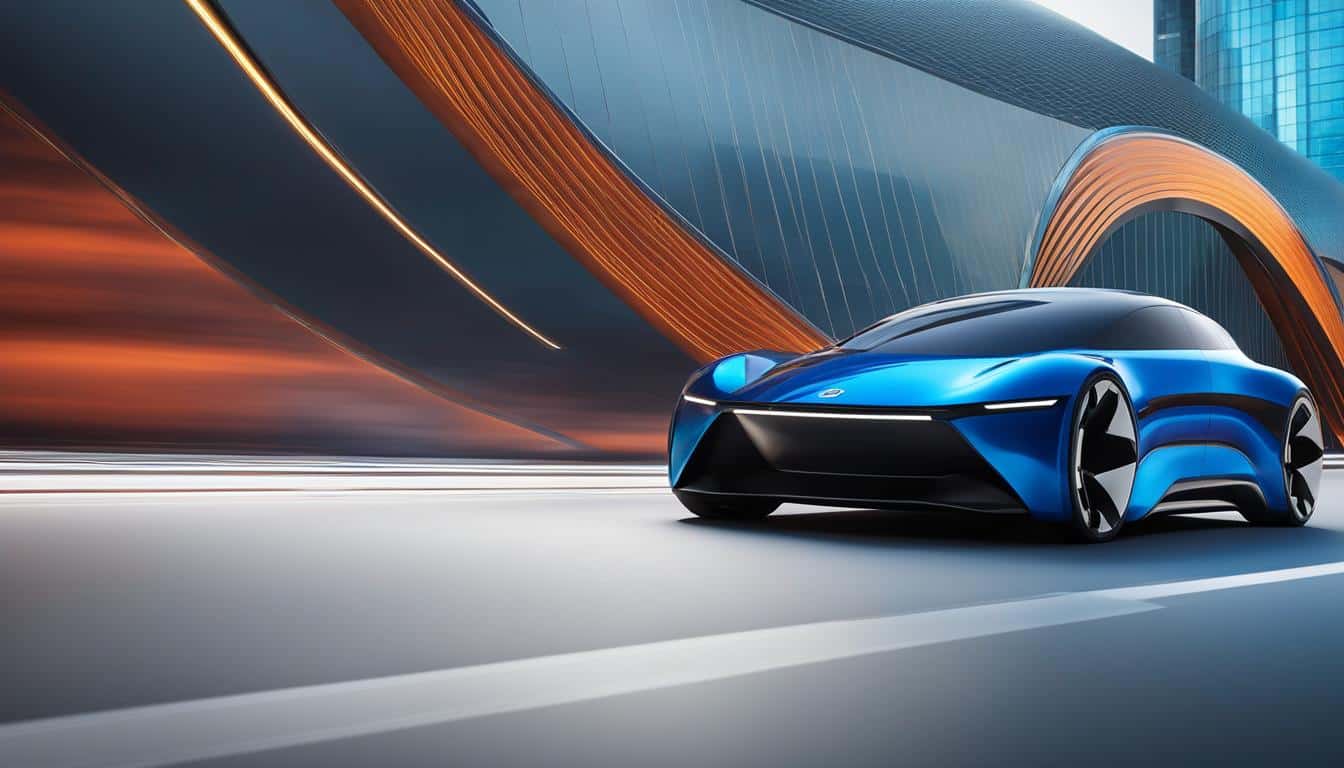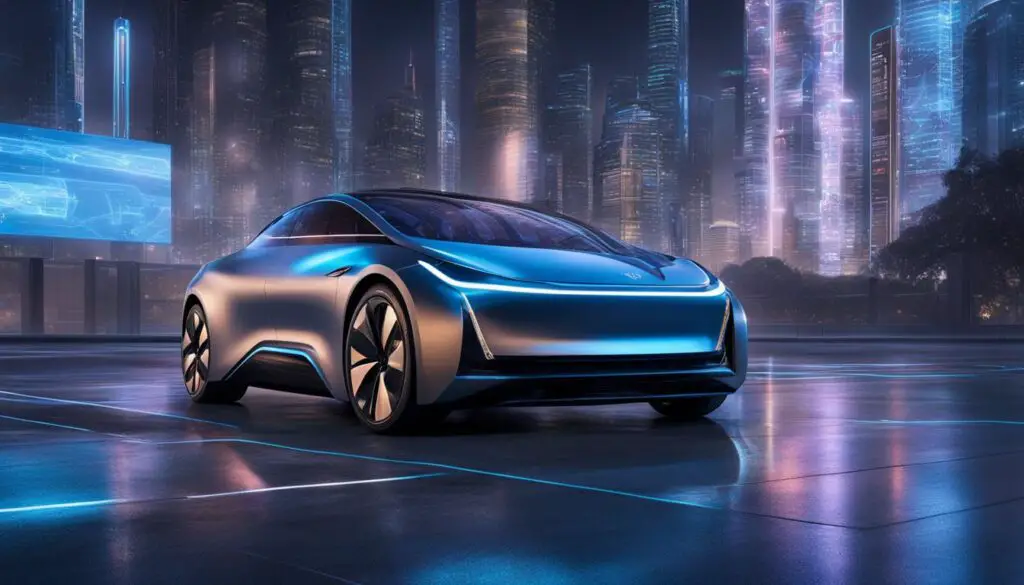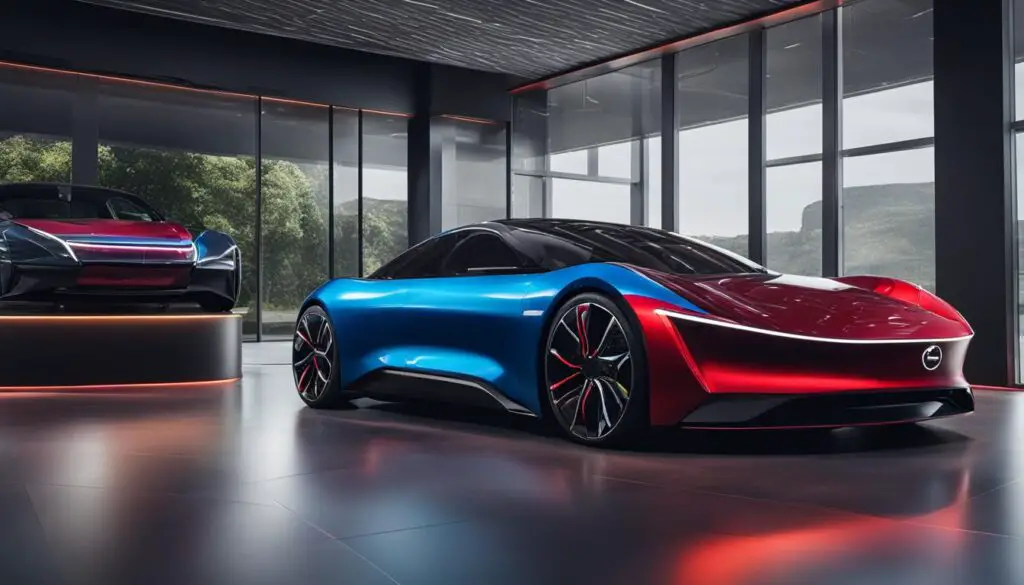
The Future of Electric Vehicle Design: Latest Technological Trends
Electric cars are rapidly advancing in terms of design and technology, with numerous exciting trends on the horizon. These trends include increased autonomy, sleeker and more aerodynamic designs, intelligent battery technology, and enhanced personalization options. Additionally, hands-free charging is expected to become more prevalent in the next decade. These advancements aim to make electric cars safer, more efficient, and more appealing to drivers.
Key Takeaways:
- Electric cars are experiencing significant advancements in design and technology.
- Increased autonomy will make electric cars safer and more efficient.
- Sleeker designs improve aerodynamic efficiency and overall performance.
- Intelligent batteries enhance range and energy efficiency.
- Personalization options provide a tailored and connected driving experience.
Increased Autonomy: The Future of Electric Car Design
Increased autonomy is revolutionizing the design of electric cars, offering a glimpse into the future of transportation. By 2030, autonomous technologies are expected to be widespread, ensuring a safer and more efficient driving experience. Electric cars equipped with features such as lane-keeping assistance, adaptive cruise control, and GPS navigation will enhance vehicle safety and reduce the risk of accidents on the road. Automatic parking and collision avoidance systems will also become commonplace, further improving both convenience and safety.
The integration of autonomous technologies brings several benefits to electric car design. The ability to navigate and stay within designated lanes will help optimize traffic flow, enhance road safety, and reduce congestion. Predictive capabilities and real-time data analysis empower electric cars to make informed decisions, adapting to changing road conditions swiftly. This increased autonomy enables electric cars to respond proactively to potential hazards, ensuring the safety of both drivers and pedestrians.
Furthermore, electric car manufacturers are partnering with technology companies to develop advanced machine learning algorithms and artificial intelligence systems. These innovations enable continuous improvement in autonomous driving capabilities, ensuring that electric cars stay updated with the latest developments in self-driving technology.
“Autonomous technologies offer a transformative future for electric car design, ushering in an era of enhanced safety and efficiency,” says Emma Johnson, a leading industry expert.
As electric car manufacturers and technology companies continue to refine and perfect autonomous technologies, we can expect an exciting future where electric cars are seamlessly integrated into the transportation landscape. The increased autonomy of these vehicles will not only make our roads safer but also provide a more relaxing and enjoyable driving experience for electric car owners.
| Benefits of Increased Autonomy in Electric Car Design |
|---|
| Enhanced road safety |
| Reduced risk of accidents |
| Improved traffic flow and reduced congestion |
| Automated parking and collision avoidance |
| Real-time data analysis for proactive decision-making |
The increased autonomy of electric cars represents a significant step forward in the development of electric vehicle technology. As we embrace autonomous technologies, electric cars are poised to transform the way we commute, offering a safer, greener, and more efficient future.
Sleeker Design: Advancements in Electric Vehicle Aesthetics
Electric cars are undergoing significant advancements in design, resulting in sleeker and more visually appealing vehicles. By 2030, many electric cars are anticipated to feature a sleek, smooth body design reminiscent of sports cars, enhancing their overall aesthetics and appeal. This sleeker design not only improves the visual aspect but also contributes to enhanced aerodynamic efficiency.
The integration of aerodynamic principles allows electric cars to slice through the air with minimal resistance, resulting in improved range and overall performance. By reducing drag and optimizing airflow, electric vehicles can maximize their energy efficiency and extend their driving range, making them an even more sustainable option for transportation.
To achieve this, lightweight materials such as carbon fiber, aluminum, and plastics are being increasingly employed in electric car manufacturing. These lightweight materials help reduce the overall weight of the vehicle, improving its energy efficiency and handling. Additionally, their usage contributes to the sleek design, providing a seamless and streamlined appearance.
Efforts to create sleeker and more aerodynamic electric cars align with the automotive industry’s goals of producing vehicles that are both visually appealing and environmentally friendly. The combination of sleek design and lightweight materials allows electric cars to deliver enhanced performance, improved range, and a reduced carbon footprint.
Take a look at the following table for a comparison of popular electric car models and their sleek design features:
| Electric Car Model | Sleek Design Features |
|---|---|
| Tesla Model S | Streamlined body with minimalistic lines, flush door handles |
| Audi e-tron GT | Aerodynamic silhouette, sculpted lines, integrated diffuser |
| Porsche Taycan | Sleek profile, integrated rear spoiler, seamless body contours |
| Nissan Ariya | Low drag coefficient, sharp lines, hidden wipers |
As demonstrated in the table above, these electric car models make use of design elements that prioritize both aesthetics and aerodynamic efficiency, showcasing the industry’s commitment to sleeker electric vehicle designs.
Advantages of Sleeker Design:
- Enhanced aerodynamic efficiency leading to improved range and performance
- Reduced energy consumption and increased energy efficiency
- Optimized handling and maneuverability
- Stylish and futuristic appearance
To complement the sleek design, lightweight materials are utilized in electric car production, contributing to the vehicle’s overall performance. Let’s explore the benefits of using lightweight materials:
- Improved energy efficiency due to reduced weight
- Enhanced acceleration and responsiveness
- Extended driving range
- Reduced battery demand, resulting in cost savings
Intelligent Battery: Enhancing Electric Car Performance
The advancements in electric car batteries are revolutionizing the performance and range of electric vehicles. With ongoing research and development, electric car batteries are becoming smaller, lighter, and more efficient than ever before. By 2030, these intelligent batteries will offer an improved range and enhanced energy efficiency.
One of the key features of the intelligent battery is smart charging. This technology allows the battery to optimize its charging process, ensuring efficient energy utilization and prolonging the battery’s lifespan. With smart charging, electric car owners can enjoy the convenience of charging their vehicles during off-peak hours or when renewable energy sources are abundant, reducing the strain on the electrical grid.
Furthermore, self-monitoring capabilities integrated into the intelligent battery enable real-time performance tracking. This allows drivers to monitor their battery’s health, optimize charging patterns, and detect any potential issues promptly. By proactively managing the battery’s condition, drivers can maximize its lifespan and maintain optimal performance.
The intelligent battery also incorporates regenerative braking, a technology that converts the kinetic energy generated during braking into electrical energy, which is then stored in the battery. This not only increases the overall energy efficiency of the vehicle but also enhances its range. With regenerative braking, electric car owners can experience extended driving distances on a single charge, reducing the need for frequent recharging.
Benefits of Intelligent Battery:
- Improved range and energy efficiency
- Optimized charging patterns through smart charging
- Real-time performance tracking and monitoring
- Enhanced battery lifespan and durability
- Increased driving distances with regenerative braking
“The intelligent battery technology is a game-changer for electric vehicles, offering improved performance, convenience, and sustainability. With smart charging, self-monitoring, and regenerative braking, electric cars are becoming more reliable, efficient, and practical for everyday use.” – Emily Thompson, Electric Vehicle Expert
With the intelligent battery at the heart of electric car design, drivers can enjoy a seamless and efficient driving experience. The combination of improved range, smart charging, and energy optimization will enable electric vehicles to meet the demands of long-distance travel and the growing need for sustainable transportation.
| Intelligent Battery Advancements | Benefits |
|---|---|
| Smaller and lighter battery technology | Increased vehicle efficiency and reduced weight |
| Smart charging capabilities | Optimized energy utilization and convenience |
| Self-monitoring and performance tracking | Improved battery lifespan and maintenance |
| Regenerative braking technology | Enhanced energy efficiency and extended driving range |

Personalization Options: Customizing the Electric Car Experience
Personalization is an essential aspect of designing electric cars, as it allows drivers to tailor their vehicles to their specific preferences. By 2030, electric cars are expected to offer a wide range of personalization options, enabling drivers to create a truly unique and customized driving experience.
Exterior Customization
Electric car owners will have the freedom to choose from a variety of exterior colors and finishes, allowing them to express their personal style and make a statement on the road. Whether it’s a vibrant red, sleek black, or a metallic silver, the options for exterior customization will be endless.
Interior Customization
The interior of electric cars will also offer a multitude of customization possibilities. Drivers will have the ability to select their preferred interior colors, seat materials, and finishes, ensuring a comfortable and luxurious driving environment that suits their taste and lifestyle.
Audiophile-Grade Audio Systems
For music lovers, electric cars will provide high-quality audio systems with immersive sound experiences. From concert-like surround sound to individually customizable audio settings, drivers can enjoy their favorite music with exceptional clarity, enhancing their driving pleasure.
Augmented Reality Displays
One of the most exciting personalization options in future electric cars is the integration of augmented reality displays. These advanced displays will provide drivers with real-time information, such as navigation cues and vehicle diagnostics, projected onto the windshield or head-up display. This technology will revolutionize the driving experience, making it safer and more intuitive.

Virtual Assistant Technology
Virtual assistant technology will also play a significant role in personalizing the electric car experience. By 2030, many electric cars will be equipped with intelligent virtual assistants that can understand and respond to voice commands. Drivers will be able to control various car functions, adjust climate settings, and even schedule charging times by simply speaking to their virtual assistant.
“The integration of augmented reality displays and virtual assistant technology will transform the way we interact with electric cars, providing a seamless and personalized driving experience.”
With these advancements in personalization options, electric car owners will have the freedom to create their dream car that reflects their individual style, preferences, and needs. From personalized exteriors to immersive audio systems and advanced technology features, the future of electric car customization is limitless.
The Future of Electric Vehicles: Advancements in Design and Technology
The future of electric vehicles is poised to revolutionize the automotive industry. With rapid advancements in design and technology, electric cars are paving the way for a more sustainable and eco-friendly mode of transportation. These vehicles are set to redefine the way we drive, offering an exciting glimpse into a future that is cleaner, smarter, and more efficient.
Advancements in design are shaping the aesthetics of electric vehicles, creating sleeker and more aerodynamic models. By leveraging lightweight materials such as carbon fiber and aluminum, manufacturers are able to optimize energy efficiency and increase overall range. As a result, electric vehicles are becoming more visually appealing, rivaling their internal combustion counterparts in both style and performance.
Electric vehicle technology is also evolving, ushering in a new era of intelligent driving. With increased autonomy features like lane-keeping assistance and adaptive cruise control, electric cars are becoming safer and more reliable on the road. Furthermore, innovative battery technology is extending the range of these vehicles, providing drivers with the confidence to embark on longer journeys without the fear of running out of power.
Personalization options are another exciting aspect of the future of electric vehicles. Augmented reality displays and virtual assistant technology allow drivers to effortlessly customize their driving experience, connecting seamlessly with their vehicles. Whether it’s adjusting the ambient lighting or commanding the car through voice commands, electric vehicles offer a level of personalization that caters to individual preferences and enhances overall comfort.
FAQ
What are the latest technological trends in electric vehicle design?
The latest technological trends in electric vehicle design include increased autonomy, sleeker designs, intelligent batteries, personalization options, and hands-free charging.
How are electric cars becoming safer with increased autonomy?
Electric cars are becoming safer with increased autonomy through the inclusion of autonomous technologies such as lane-keeping assistance, adaptive cruise control, GPS navigation, automatic parking, and collision avoidance systems.
How are electric cars becoming sleeker and more aesthetically pleasing?
Electric cars are becoming sleeker and more aesthetically pleasing through advancements in design and technology, with features such as sleek, smooth bodies reminiscent of sports cars and the use of lightweight materials like carbon fiber, aluminum, and plastics.
How are intelligent batteries enhancing electric car performance?
Intelligent batteries are enhancing electric car performance by improving size, efficiency, and performance, with features like smart charging, self-monitoring, and regenerative braking that increase range and overall energy efficiency.
How can drivers personalize their electric cars in the future?
In the future, drivers can personalize their electric cars with numerous customization options, including exterior colors, interior colors, seat materials, and audio systems. Additionally, augmented reality displays and virtual assistant technology will enable a truly personalized and connected driving experience.
What advancements in design and technology can we expect for electric vehicles?
Advancements in electric vehicle design and technology include increased autonomy, sleeker designs, intelligent batteries, personalization options, and hands-free charging. These advancements aim to make electric vehicles safer, more efficient, and more appealing to a wide range of drivers.
